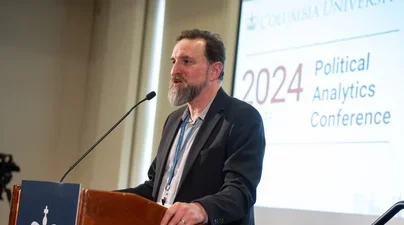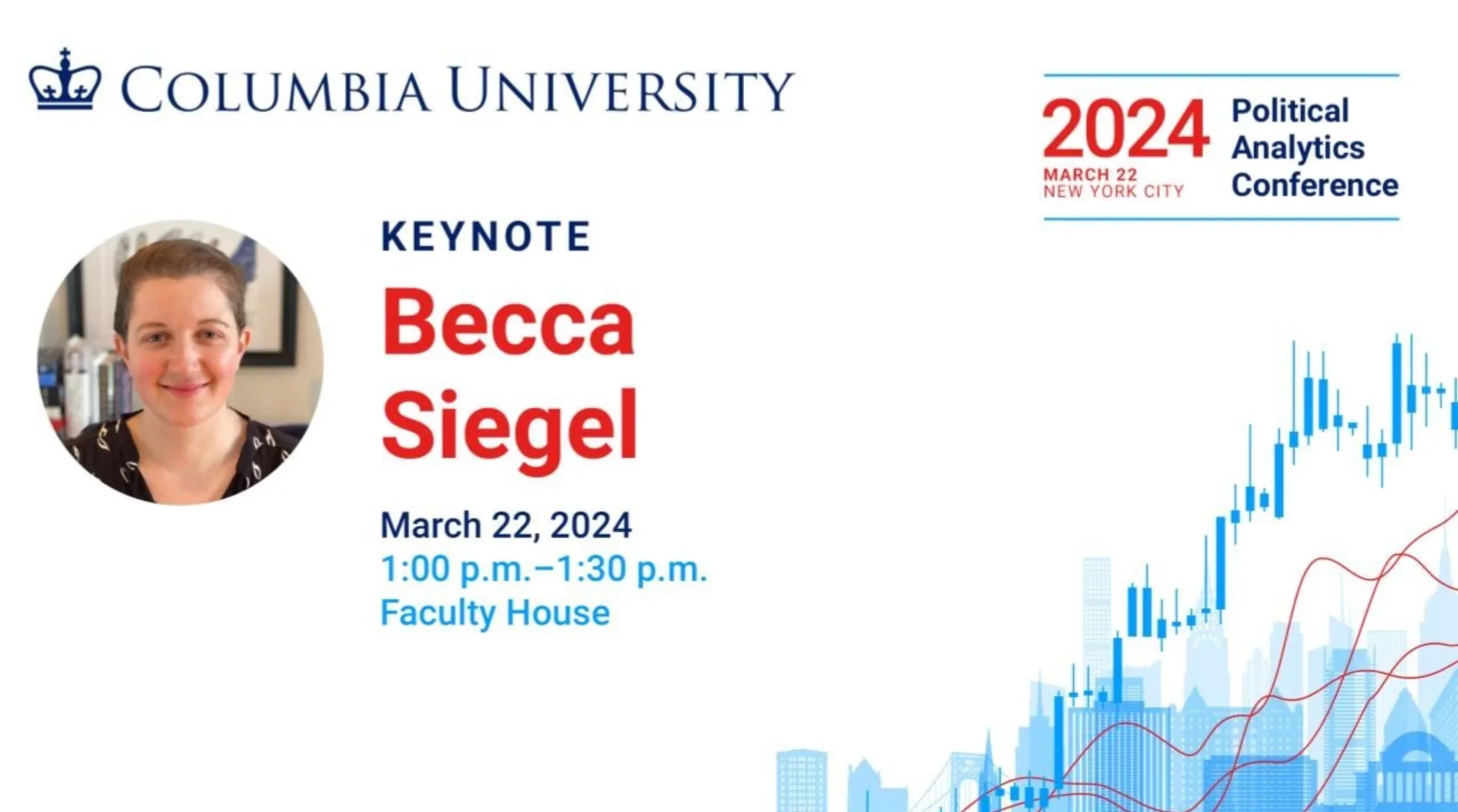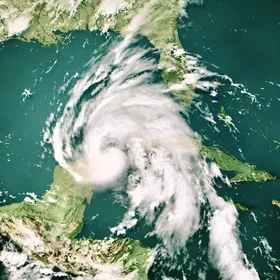On March 22, the Master of Science in Political Analytics program at Columbia University School of Professional Studies (SPS) hosted its inaugural Political Analytics Conference, a daylong symposium that explored the intricacies of polling, persuasion, and modeling politics.
Troy Eggers, dean of SPS, kicked off the conference, stressing the importance of what he termed the “intersection of data and democracy” and the potential of statistical analysis in electoral politics to impact the lives of millions and alter the course of history.
“Insights gleaned from data analytics have the power to shape policy-making,” he said. “The stakes simply could not be higher.”
Predicting Elections in an Unstable Political Environment
The first panel considered the challenges of predicting elections in our current political climate. Joe Lenski, president and exit poll director for Edison Market Research, pointed out that polling was easier when people went to the polls to vote. Now, he said, “we’re playing three-dimensional chess with early voting and voting by mail.”
And it’s likely to get even more complex. According to Ethan Rosen, associate general counsel for Predictit, artificial intelligence extrapolation will allow us to “access vast troves of data” and isolate trends people might not find otherwise, such as speeding tickets or movie streaming histories, to target political advertising.
Asked by Gregory Wawro, M.S. in Political Analytics program director and professor of political science, about “anticipated curveballs” in making predictions in the coming election, Lenski pointed out the potential problems posed by the loss of experienced election officials following the turbulent 2020 election.
“We’re going to see 25, 30, 35 percent of election officials being new and not having experience,” Lenski said. “There’s so much data, and even though it comes from an official source, that doesn’t mean it’s officially correct.”
What Is Effective Political Advertising?
A session addressing media strategy and data analytics led panelists to offer career advice to students. “Most campaign managers and politicians are not data analysts,” said Lee Dunn, a former director of international elections outreach and political advertising sales at Google and YouTube. “We always look to hire people who want to be in an environment where decisions are data-driven.”
Steve McAlpine (GSAS’17), founder and media impact specialist at INTRVL, stressed the importance of intellectual curiosity and the ability to contextualize complicated information in persuasive ways. “It’s not just selling products; there’s hearts and minds,” he said.
Keynote address
Columbia aluma Becca Siegel (GSAS’18), delivered a keynote speech addressing the still-new and always-evolving field of data analytics. “The fact that there is a way for people to learn this in an institution is amazing,” she said, “and a lot of the history of the development of the field is here in this room.”
Siegel discussed common pitfalls in building campaign strategies, including the fact that “polls are sometimes wrong.” And she stressed the reality of focusing campaign energy and expenditures on swing districts, perhaps at the expense of speaking to others.
“You piece together these states to get 270 electoral votes,” she said. “You don’t become president by getting more electoral votes. In a scenario where the polling is close, what states do we need to win?”
Is Polling Dead or Just on Life Support?
An afternoon panel asked, “Is polling dead?”, to which the panelists—all professionals in the field—quickly replied “no” with a laugh.
Moderator Kelly Rader (GSAS’12), a lecturer in the Political Analytics program, called polling in the current climate “the Wild West,” saying that there are all kinds of polling and sampling methods being used and that it’s rarely clear what methodologies were used on particular polls.
Robert Shapiro, Wallace S. Sayre Professor of Government at Columbia, noted that some polling firms now “doggedly” go after respondents and offer financial incentives in order to increase the size and diversity of the sample.
Strategic Voter Mobilization and Persuasion
The final session of the day offered panelists the opportunity to reflect about the rewards and responsibilities that come with their industry. Panelists discussed the ways in which election results and demographic information such as voter turnout by district are delivered to the press—and what campaign analysts and the media can do with that data.
“To me, the role of politics is to speak to people about what they care about. Analytics allows us to speak to people individually. That’s what politics should be about, speaking to people about what they care about,” said Chris Wilson, an analytics and data strategist with WPA Intelligence.
“New York is a wonderful state to practice campaign politics in, because you have such a diverse community, and microtargeting becomes important,” said Harry Granalis, CEO of the Parkside Group. “Every day, I open up a newspaper and I say, ‘That would not have happened without me and my team.’ That is not something you get a feeling for in a lot of other businesses.”
“Some of the hard skills or qualitative skills can be taught on the job, but it’s really hard to teach that quantitative analysis,” said Christine Coloroso, executive director at Analyst Institute. But students and recent graduates should also get experience working on campaigns, in polling, and on Election Day, even as a volunteer, to get the “perspective to zoom out and understand what the data means and what to do with it.”

M.S. in Political Analytics Program Director Gregory Wawro.
Why Data Analysis in Politics Is Important
“These panels showcased some of the ways that data analytics is at the heart of what we know and do in politics, from predicting outcomes to buying media to persuading voters to support a candidate or a side of an issue,” said Wawro in his closing remarks at the end of the conference.
He suggested that the conference had achieved its goals by stating, “We wanted to highlight some of the best thinkers in political analytics alongside the great work being done right here on campus. Analytics is now central in politics and advocacy, and this event helped showcase the SPS master’s program in Political Analytics for those who want to advance their careers.”
About the Program
The Columbia University M.S. in Political Analytics program provides students quantitative skills in an explicitly political context, facilitating crosswalk with nontechnical professionals and decision-makers—and empowers students to become decision-makers themselves.
The 36-credit program is available part-time and full-time. For general information and admissions questions, please call 212-854-9666 or email politicalanalytics [[at]] sps [[dot]] columbia [[dot]] edu.



